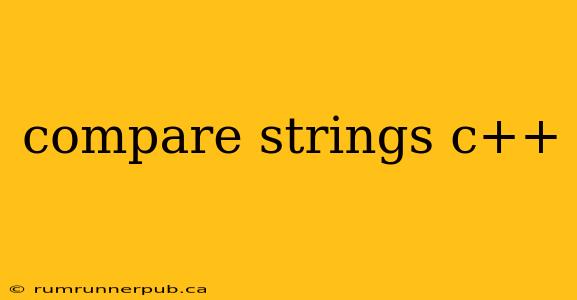Comparing strings is a fundamental operation in any programming language, and C++ offers several ways to achieve this. This article explores various methods, drawing upon insights from Stack Overflow, and providing practical examples and explanations to help you choose the best approach for your needs.
Choosing the Right Comparison Method
The optimal method for comparing strings in C++ depends heavily on your specific requirements. Are you looking for an exact match? Are you concerned about case sensitivity? Do you need to compare only parts of strings?
Let's delve into the common approaches:
1. Using == for Exact String Comparison
The simplest method to check for exact equality is the == operator. This directly compares the contents of two strings.
Example:
#include <iostream>
#include <string>
int main() {
std::string str1 = "Hello";
std::string str2 = "Hello";
std::string str3 = "World";
if (str1 == str2) {
std::cout << "str1 and str2 are equal" << std::endl;
}
if (str1 == str3) {
std::cout << "str1 and str3 are equal" << std::endl; // This won't execute
}
return 0;
}
This is a straightforward approach, directly leveraging C++'s built-in string comparison. This method is case-sensitive; "Hello" and "hello" would be considered unequal.
2. Case-Insensitive Comparison
For case-insensitive comparisons, you'll need to convert both strings to either uppercase or lowercase before comparison. This can be achieved using algorithms from the <algorithm> header.
Example (using std::transform – inspired by Stack Overflow solutions):
#include <iostream>
#include <string>
#include <algorithm>
#include <cctype> // for tolower
bool caseInsensitiveCompare(const std::string& str1, const std::string& str2) {
std::string lowerStr1 = str1;
std::string lowerStr2 = str2;
std::transform(lowerStr1.begin(), lowerStr1.end(), lowerStr1.begin(), ::tolower);
std::transform(lowerStr2.begin(), lowerStr2.end(), lowerStr2.begin(), ::tolower);
return lowerStr1 == lowerStr2;
}
int main() {
std::string str1 = "Hello";
std::string str2 = "hello";
if (caseInsensitiveCompare(str1, str2)) {
std::cout << "Strings are equal (case-insensitive)" << std::endl;
}
return 0;
}
This example demonstrates a function that performs a case-insensitive comparison using std::transform and ::tolower. This approach is more efficient than repeatedly converting strings within the main comparison loop. (Similar approaches using std::toupper are equally valid). This technique is commonly used and discussed extensively on Stack Overflow.
3. Partial String Comparison using std::string::find
If you need to check if one string is a substring of another, std::string::find is your tool.
Example:
#include <iostream>
#include <string>
int main() {
std::string str1 = "This is a test string";
std::string str2 = "test";
if (str1.find(str2) != std::string::npos) {
std::cout << "str2 is a substring of str1" << std::endl;
}
return 0;
}
std::string::npos indicates that the substring was not found.
4. Lexicographical Comparison using < and >
The < and > operators perform lexicographical comparisons, similar to dictionary ordering. This is useful for sorting strings.
Example:
#include <iostream>
#include <string>
int main() {
std::string str1 = "apple";
std::string str2 = "banana";
if (str1 < str2) {
std::cout << "apple comes before banana lexicographically" << std::endl;
}
return 0;
}
Remember, this comparison is case-sensitive.
Conclusion
This article provided a comprehensive overview of string comparison techniques in C++, drawing upon common solutions found on Stack Overflow and adding practical examples and explanations. Choosing the right method depends on your specific needs – exact match, case sensitivity, partial matches, or lexicographical ordering. By understanding these approaches, you can effectively handle string comparisons in your C++ projects. Remember to consult the official C++ documentation and explore relevant Stack Overflow threads for further in-depth understanding and advanced techniques.
